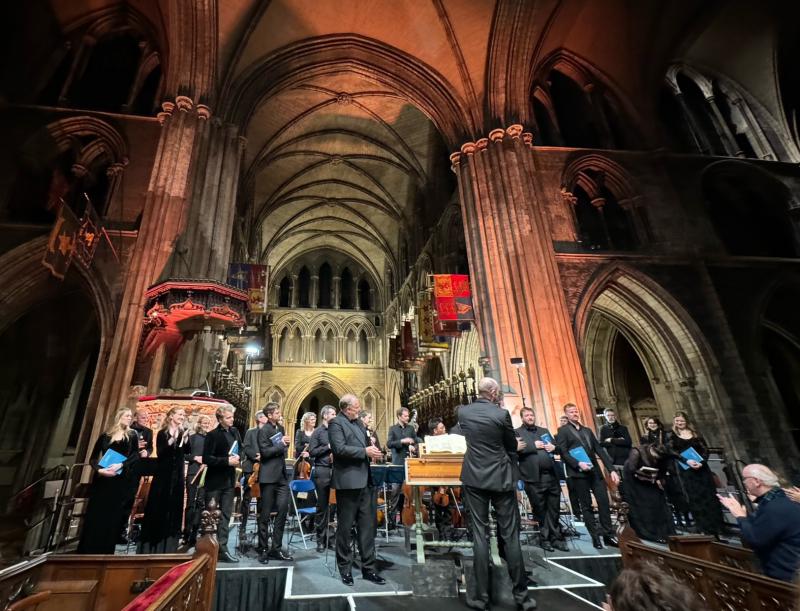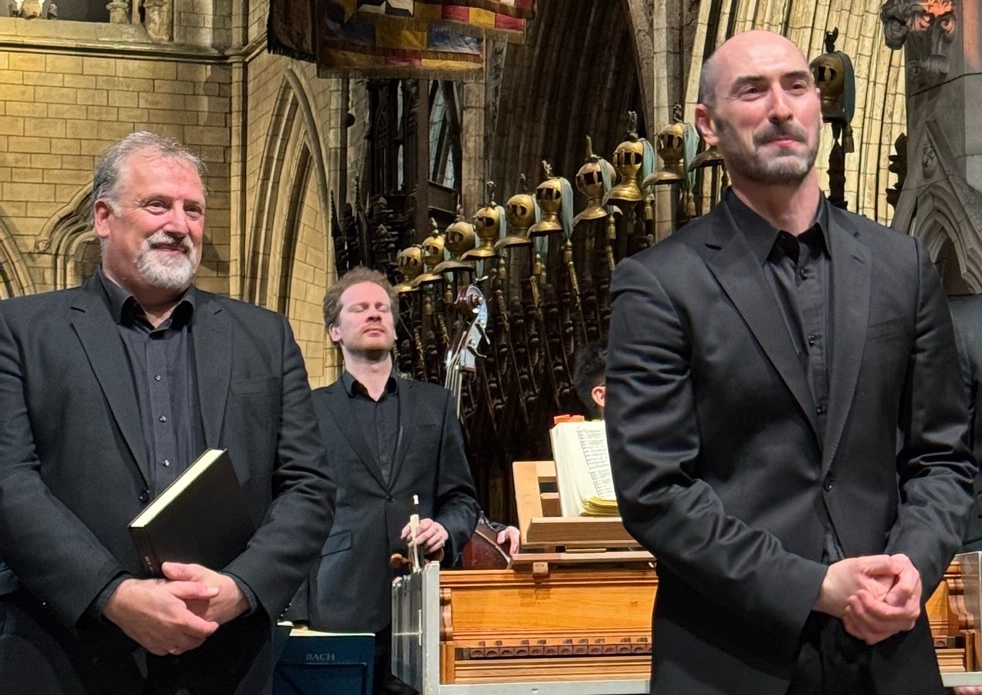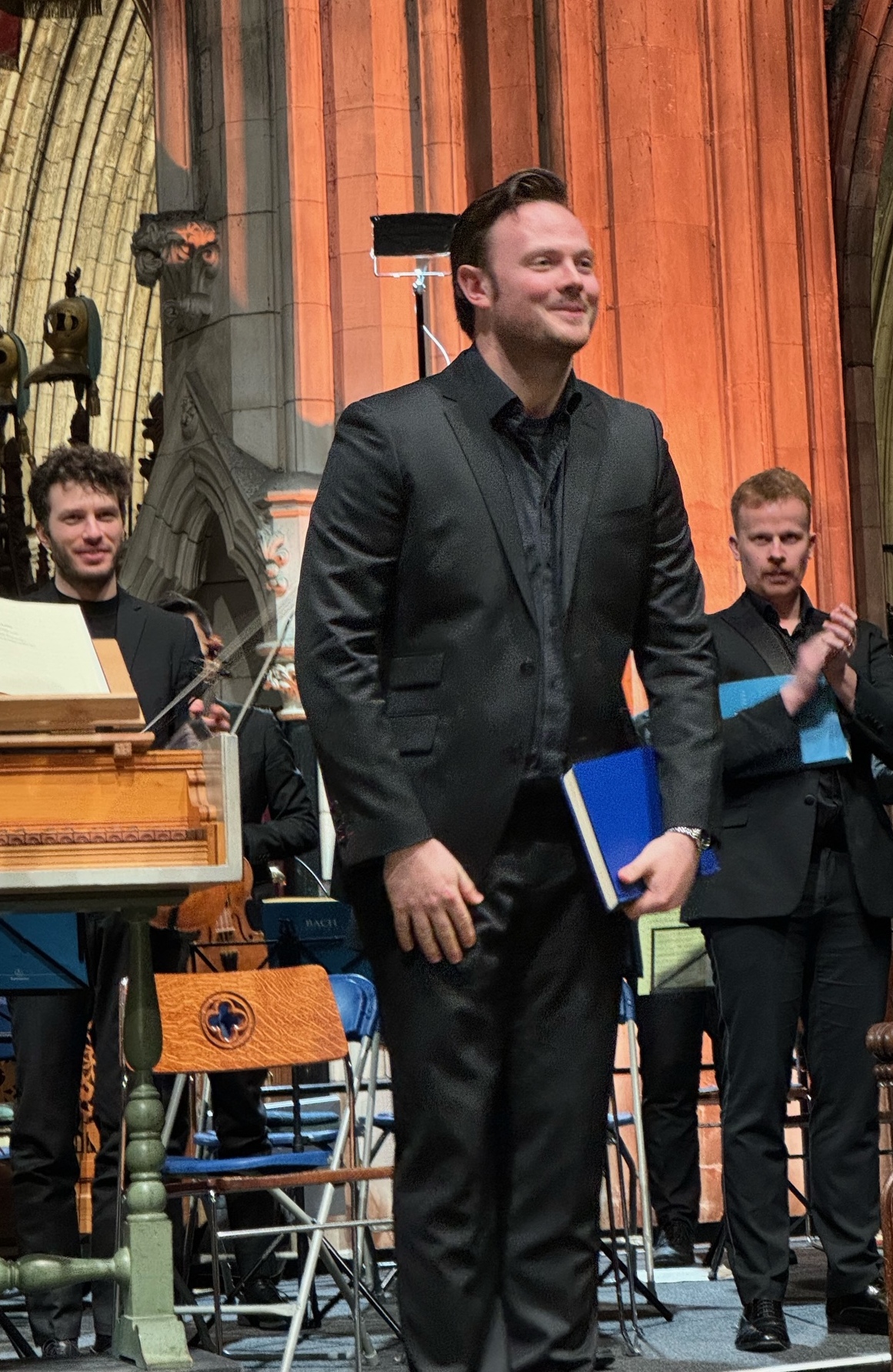St Matthew Passion, Irish Baroque Orchestra, Whelan, St Patrick’s Cathedral, Dublin review - fluency, fire and some jaw-dropping solos | reviews, news & interviews
St Matthew Passion, Irish Baroque Orchestra, Whelan, St Patrick’s Cathedral, Dublin review - fluency, fire and some jaw-dropping solos
St Matthew Passion, Irish Baroque Orchestra, Whelan, St Patrick’s Cathedral, Dublin review - fluency, fire and some jaw-dropping solos
Near-perfection in the greatest of works

After last year’s small-scale, big-impact Messiah in the Wigmore Hall, superlatives are again in order for the IBO’s performance of the greatest musical offering known to humankind. With the fluency established by that most supple of directors Peter Whelan at the start of Bach's opening chorus leading to the astonishing heft of nine singers and gleaming instrumentalists at its culmination, we knew we were in for something approaching perfection.
And that was to reckon without three soloists who, while they may not be big names outside the inner circle of musicians, simply couldn’t be surpassed in Bach for tone and meaning – Evangelist Nick Pritchard, Jesus/soloist/choral bass 1 Matthew Brook (pictured below on the left with Peter Whelan) and alto Hugh Cutting. As Helen Charlston’s “He was despised” plumbed the depths in last year’s Handel, so Cutting went further than one thought possible in “Erbarme dich”. Not only did this banish a usual prejudice of mine that only a mezzo or contralto is good enough here – Cutting’s colourings ran the gamut, including a clarion lower register – but I’d go so far as to say that this is the most dramatically expressive countertenor singing I’ve ever heard.  It was theatrically of a piece with the intensity of Matthew Brook – no haloed icon of a Christus, but an anguished human being also conveying the fullest emotional range, and ending with such tenderness, joy and compassion in “Mache dich, mein Herze, rein”. The emotional culmination of the epic came in his supremely powerful “Eli, Eli, lama Sabathani?” and Pritchard’s awed translation, “My God, my God, why hast thou forsaken me”.
It was theatrically of a piece with the intensity of Matthew Brook – no haloed icon of a Christus, but an anguished human being also conveying the fullest emotional range, and ending with such tenderness, joy and compassion in “Mache dich, mein Herze, rein”. The emotional culmination of the epic came in his supremely powerful “Eli, Eli, lama Sabathani?” and Pritchard’s awed translation, “My God, my God, why hast thou forsaken me”.
This was an Evangelist exemplary in his handling of the German text, natural and without affectation, so that the high drama had fullest impact. Pritchard (pictured below) was backed to the hilt by the swiftness and clarity of the choral rejoinders, not just in the mob violence but above all in the invocation of divine thunder, lightning and fire, a theatrical high point of Part One.
 The beauty of Whelan’s direction is that he knows not only when to make the numbers and chorales follow in swift succession, but when to allow space and silence. The instrumental solos sang as keenly as the voices, with piercingly lovely work from the oboe family (the acoustics of St Patrick's Cathedral certainly helped). If I single out violinist Simone Pirri in “Gebt mir meinen Jesum wieder”, it’s simply because his expression of joy in the playing gave us the uplift we needed in the middle of all that sorrow. But then Bach is as much a master of contrast as Handel, and the most resourceful colourist of all.
The beauty of Whelan’s direction is that he knows not only when to make the numbers and chorales follow in swift succession, but when to allow space and silence. The instrumental solos sang as keenly as the voices, with piercingly lovely work from the oboe family (the acoustics of St Patrick's Cathedral certainly helped). If I single out violinist Simone Pirri in “Gebt mir meinen Jesum wieder”, it’s simply because his expression of joy in the playing gave us the uplift we needed in the middle of all that sorrow. But then Bach is as much a master of contrast as Handel, and the most resourceful colourist of all.
Democracy gave all bar one of the nine main singers doubling chorus a solo or two, and there was more lustre on display, above all from soprano Charlotte O’Hare, a tenor of equal but different distinction to Pritchard in Hugo Hymas, and true bass William Gaunt. But the important thing is the impact of the whole, and in that Whelan’s musicians covered the full spectrum.
rating
Explore topics
Share this article
The future of Arts Journalism
You can stop theartsdesk.com closing!
We urgently need financing to survive. Our fundraising drive has thus far raised £49,000 but we need to reach £100,000 or we will be forced to close. Please contribute here: https://gofund.me/c3f6033d
And if you can forward this information to anyone who might assist, we’d be grateful.

Subscribe to theartsdesk.com
Thank you for continuing to read our work on theartsdesk.com. For unlimited access to every article in its entirety, including our archive of more than 15,000 pieces, we're asking for £5 per month or £40 per year. We feel it's a very good deal, and hope you do too.
To take a subscription now simply click here.
And if you're looking for that extra gift for a friend or family member, why not treat them to a theartsdesk.com gift subscription?
more Classical music
 Robin Holloway: Music's Odyssey review - lessons in composition
Broad and idiosyncratic survey of classical music is insightful but slightly indigestible
Robin Holloway: Music's Odyssey review - lessons in composition
Broad and idiosyncratic survey of classical music is insightful but slightly indigestible
 Classical CDs: Wolf-pelts, clowns and social realism
British ballet scores, 19th century cello works and contemporary piano etudes
Classical CDs: Wolf-pelts, clowns and social realism
British ballet scores, 19th century cello works and contemporary piano etudes
 Bizet in 150th anniversary year: rich and rare French offerings from Palazzetto Bru Zane
Specialists in French romantic music unveil a treasure trove both live and on disc
Bizet in 150th anniversary year: rich and rare French offerings from Palazzetto Bru Zane
Specialists in French romantic music unveil a treasure trove both live and on disc
 Scottish Chamber Orchestra, Ibragimova, Queen’s Hall, Edinburgh review - rarities, novelties and drumrolls
A pity the SCO didn't pick a better showcase for a shining guest artist
Scottish Chamber Orchestra, Ibragimova, Queen’s Hall, Edinburgh review - rarities, novelties and drumrolls
A pity the SCO didn't pick a better showcase for a shining guest artist
 Kilsby, Parkes, Sinfonia of London, Wilson, Barbican review - string things zing and sing in expert hands
British masterpieces for strings plus other-worldly tenor and horn - and a muscular rarity
Kilsby, Parkes, Sinfonia of London, Wilson, Barbican review - string things zing and sing in expert hands
British masterpieces for strings plus other-worldly tenor and horn - and a muscular rarity
 From Historical to Hip-Hop, Classically Black Music Festival, Kings Place review - a cluster of impressive stars for the future
From quasi-Mozartian elegance to the gritty humour of a kitchen inspection
From Historical to Hip-Hop, Classically Black Music Festival, Kings Place review - a cluster of impressive stars for the future
From quasi-Mozartian elegance to the gritty humour of a kitchen inspection
 Shibe, LSO, Adès, Barbican review - gaudy and glorious new music alongside serene Sibelius
Adès’s passion makes persuasive case for the music he loves, both new and old
Shibe, LSO, Adès, Barbican review - gaudy and glorious new music alongside serene Sibelius
Adès’s passion makes persuasive case for the music he loves, both new and old
 Anja Mittermüller, Richard Fu, Wigmore Hall review - a glorious hall debut
The Austrian mezzo shines - at the age of 22
Anja Mittermüller, Richard Fu, Wigmore Hall review - a glorious hall debut
The Austrian mezzo shines - at the age of 22
 First Person: clarinettist Oliver Pashley on the new horizons of The Hermes Experiment's latest album
Compositions by members of this unusual quartet feature for the first time
First Person: clarinettist Oliver Pashley on the new horizons of The Hermes Experiment's latest album
Compositions by members of this unusual quartet feature for the first time
 Gesualdo Passione, Les Arts Florissants, Amala Dior Company, Barbican review - inspired collaboration excavates the music's humanity
At times it was like watching an anarchic religious procession
Gesualdo Passione, Les Arts Florissants, Amala Dior Company, Barbican review - inspired collaboration excavates the music's humanity
At times it was like watching an anarchic religious procession
 Classical CDs: Camels, concrete and cabaret
An influential American composer's 90th birthday box, plus British piano concertos and a father-and-son duo
Classical CDs: Camels, concrete and cabaret
An influential American composer's 90th birthday box, plus British piano concertos and a father-and-son duo
 Cockerham, Manchester Camerata, Sheen, Martin Harris Centre, Manchester review - re-enacting the dawn of modernism
Two UK premieres added to three miniatures from a seminal event of January 1914
Cockerham, Manchester Camerata, Sheen, Martin Harris Centre, Manchester review - re-enacting the dawn of modernism
Two UK premieres added to three miniatures from a seminal event of January 1914

Add comment